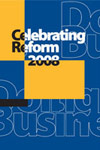Overview
In Poland, going through a lawsuit and enforcing a judgment had the potential to be a nightmare. The average judgment took close to half a year to enforce, and hard-to-enforce judgments could take years. In fact, the 2005 Doing Business report ranked Poland as having one of the world’s slowest judiciaries—averaging 1,000 days to enforce a contract, including an average of 180 days just to enforce a judgment. After commissioning a study, the new Polish government decided that the noncompetitive organization of the bailiff profession—mainly responsible for enforcing judgments to collect debt—was to blame for the slow enforcement of judgments. So, in 2007 the Polish government attempted to help litigants by liberalizing the profession.
This case study tracks Poland’s reform that is intended to expand its supply of bailiffs. It also identifies 3 key factors that helped Poland overcome opposition: World Bank support, political savvy, and political will.
Main Findings
- The amendment to Poland’s Act on Court Bailiffs and Debt Collection finally passed on 24 May 2007, was published on 27 June, and entered into force on 28 December.
- The reform was a step forward, but short-term results are mixed due to political turnover and necessary compromises.

